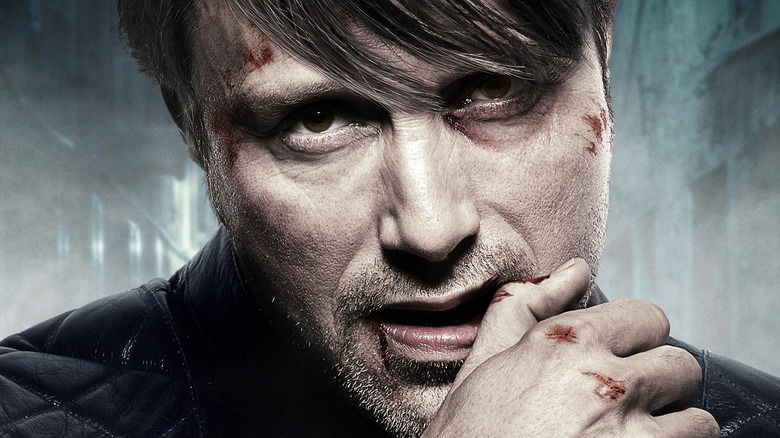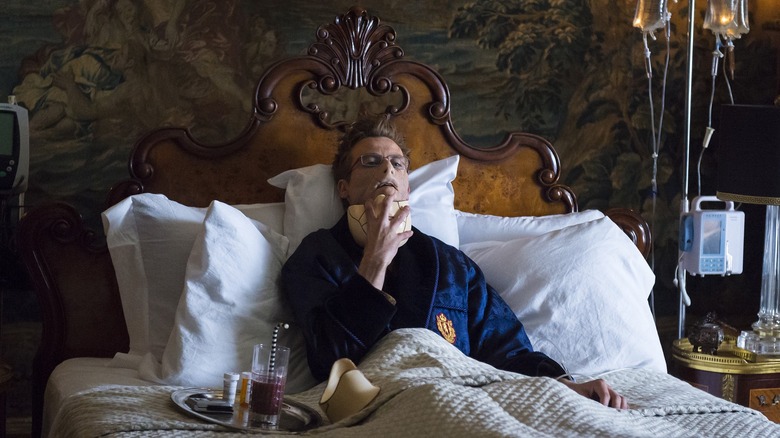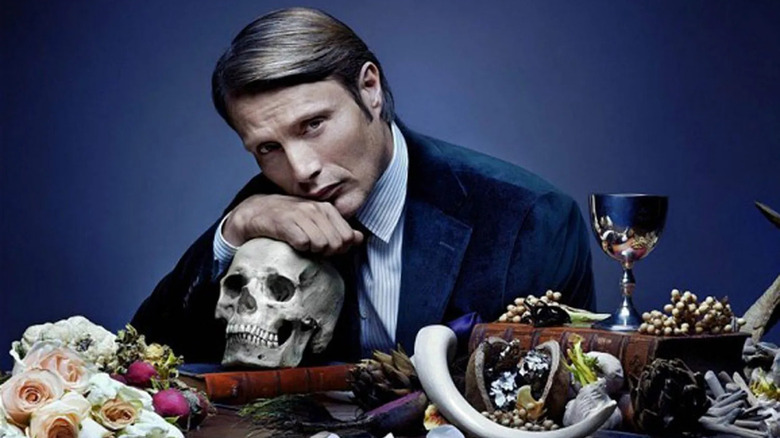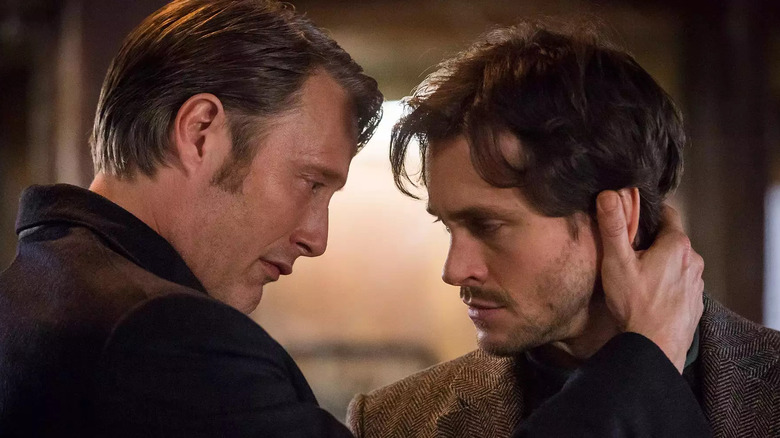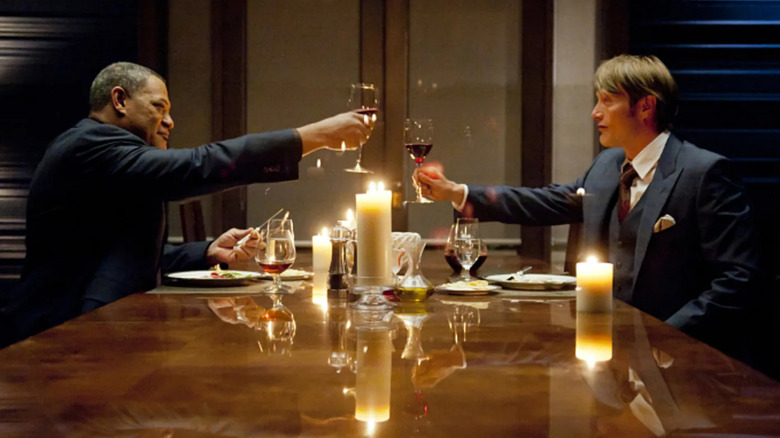TV, Interrupted: Hannibal's Cancellation Still Has Fans In A Chokehold 7 Years Later
(Welcome to TV, Interrupted, a series where the /Film team remembers, eulogizes, and makes a case for the revival of TV shows we loved that were canceled far too soon.)
If you mention "Hannibal" to the right person, a very specific reaction is all but guaranteed. It can typically be reduced to a wide-eyed desperation, a dual expression of ecstatic recognition and dejected sadness — sometimes, there's even actual foaming at the mouth.
Of course, this reference isn't for the (albeit classic) portrayal by Anthony Hopkins as the cannibalistic former shrink in Jonathan Demme's "The Silence of the Lambs." Rather, the rabid fan in question is visualizing Danish actor Mads Mikkelsen as the well-dressed foodie of flesh, playing a quasi-erotic game of cat and mouse with FBI profiler Will Graham (Hugh Dancy). Starting out as crime scene collaborators, their relationship dissolves into betrayal, obsession, and a self-destructive search for the other that spans years, continents, and respective institutionalizations.
Running for three exquisite, intricate seasons, this version of the familiar tale is simply titled "Hannibal." Though it technically had a series finale, the show's creative talent and fans alike have been practically begging for at least one more season of airtime to properly finish the story. With the last episode airing in 2015, that possibility becomes more far-fetched with each passing year.
But hope isn't lost — at least, not for the truest of "fannibals" out there.
Why Hannibal was great
Many absolutely adore "Hannibal" simply because of its overtly queer subtext. But the brilliance of the show can't be simplified into the sexual allure of its central gay-coded romance (though the actors involved suffuse this dynamic with delectable complexity). Created by Bryan Fuller (whose fairy-tale-twinged show "Pushing Daisies" was also canceled to fan ire), "Hannibal" isn't just a re-telling of "The Silence of the Lambs," even if it is named after the film's most iconic character. While the Demme film is based on the Thomas Harris novel of the same name, the series "Hannibal" takes inspiration from three different Harris novels that follow the character: "Red Dragon," "Hannibal," and "Hannibal Rising". However, the series is far from a loyal adaptation of Harris' work, instead using the storylines and elements presented in the novelist's original ideas as (sometimes literal) jumping-off points.
What really allures viewers, though, is the heady psychological slant coupled with profoundly disturbing imagery. Though the show aired on NBC (during a dreadful time slot, but we'll get to that later), it exhibits gore that is absolutely stomach-churning to witness: chunks of skin desperately ripped off, faces deformed by ravenous pigs, a cadaver turned into a functioning human cello. Honestly, this is all just scratching the surface. Each episode contains grotesque kills, with Will often using his extreme empathy to literally visualize how the sadistic killers — including Hannibal — commit their crimes.
Then, there's the rich, deliberate shots of Hannibal assembling his cannibalistic feasts, often preparing to feed them to unsuspecting dinner guests. Try not to gag as diners (including the brilliant Laurence Fishburne as head of the FBI's behavioral science unit) savor each morsel of human meat, moaning their muffled compliments to the chef in between heaping mouthfuls. It's a show one quickly learns never to sit down and eat in front of.
Above all, though, "Hannibal" is just brilliantly written, shot, and acted. At every level of the creative process, Fuller and his cast and crew imbue the show with a cinematic artfulness that simply feels lacking in serialized offerings nowadays. An unrestrained horror-thriller that discusses heady subjects — from psychoanalytic concepts to the finer elements of food and culture — aren't terribly easy to come around, especially those featured on broadcast television.
Why Hannibal was canceled
Unfortunately, the show's broadcast roots are probably what led to its premature cancellation in the first place. Though the first season aired on Thursdays, seasons 2 and 3 of "Hannibal" aired during the dreaded 10 p.m. weekend slot (first moving to Friday, and then to Saturday) — a time when most of its projected viewer base was out on the town. Though it was praised by critics and audiences during its run, NBC still cited "low viewership" as the reason why it was pulling the plug. The announcement was made while the third (and now final) season was airing, meaning that whatever "Hannibal" had in store for the season finale was all that viewers were going to get. In a statement made amid NBC's decision to cancel, Fuller said:
"NBC has allowed us to craft a television series that no other broadcast network would have dared, and kept us on the air for three seasons despite Cancelation Bear Chow ratings and images that would have shredded the eyeballs of lesser Standards & Practices enforcers ... Hannibal is finishing his last course at NBC's table this summer, but a hungry cannibal can always dine again. And personally, I look forward to my next meal with NBC."
With that, "Hannibal" was effectively put to an end. Though the show's ultimate finale was adequately melancholic and beautiful, many fans felt that a certain dynamic went totally unresolved.
Unfinished business
As previously stated, it was never too hard to read into Will and Hannibal's mutual desire. Fuller himself has even stated in multiple interviews that the characters possess a sexual attraction to each other, leaving little room for ambiguity on their relationship. Why, then, was the show concluded with a fatal embrace as opposed to a kiss?
In an effort to eschew overt spoilers, I'm going to keep the details vague (after all, if you've never seen "Hannibal", you absolutely must, and the gripping finale is best experienced fresh). After an extended search for each other, Will and Hannibal finally meet again. They are both irrevocably attracted to and repelled by the other — they're both so alike, yet so different. They possess a maddening desire to know the other, while imparting a bit of their own personal inclinations in the process. When the two come together again, they cease to become separate cosmic entities; instead, they embrace, becoming one forever.
For many fans, this embrace felt far too amicable for a duo that has shared vicarious sex scenes and violent physical (and psychological) intimacy. A passionate kiss would have translated better, particularly because of their preexisting erotic relationship. Fuller himself has even expressed regret over not including a kiss during the finale:
"If I had to do it again, I might suggest to kiss and see how it played. But neither of the actors were ever afraid of going there. If there were any concerns, it was always just about the remaining authentic. That certainly was my goal because, yes, I absolutely wanted to see them kiss. That would be wank bank material for the best of us [Laughs]. But I was just really trying to maintain authenticity in the moment. The shot that's in there felt the most authentic and felt like it struck the right balance. But if I could get back into the editing room, I might do something differently now."
Of course, this isn't to say that the resurrection of "Hannibal" would solely exist to have Will and Hannibal finally kiss. Honestly, Fuller has been candid about what he'd like the fourth season to look like, going so far to detail what he'd like to cover in a 2020 interview with Rolling Stone:
"I'd want to play point-of-view in a dramatic way. I think I've said that season 4 is 'Inception' meets 'Angel Heart.' And that means that there's going to be considerable mind-palacing and obfuscating of reality, or at least the perception of reality. And the thing that I'm most excited about is, because there's going to be such a mental landscape to explore, that means actors who play characters who have previously died can manifest in the mess of Will Graham's brain."
With a vision already conceived by Fuller, what exactly could be stopping "Hannibal" from returning?
Will Hannibal ever return?
Sadly, it looks like the prospect of a fourth season of "Hannibal" is becoming less and less likely. What makes this so heartbreaking is that everyone involved creatively — namely Fuller and the cast — has expressed unyielding dedication to returning to the show and its characters. What continually impedes them, though, is the apparent lack of interest on the behalf of streaming behemoths. Meetings were held with Netflix, Amazon, and Starz, but nothing has come to fruition. In that same Rolling Stone interview, Fuller lamented the repetitive process of rejection:
"We've let everybody know, unequivocally, that we're very interested in returning to the world, and the cast is very interested in returning to these stories. And that's kind of where it's left. We've knocked on a lot of doors. We've handed out a lot of pamphlets: 'These are our goals for the show moving forward and this is what we would like to do.' And everybody nods politely and says we'll think about it and then we usually never hear from them again [laughs]."
This doesn't mean there's no hope at all, though. It's always possible that with sustained creative gumption, another season of "Hannibal" might just see the light of day. For now, though, there's something else to look forward to from Fuller. The king of current horror camp is executive producing the Shudder limited series "Queer for Fear: The History of Queer Horror", which should hit the streamer in the coming months. At the very least, we can learn up on canonically queer horror offerings while holding our breath for the fated return of "Hannibal".
